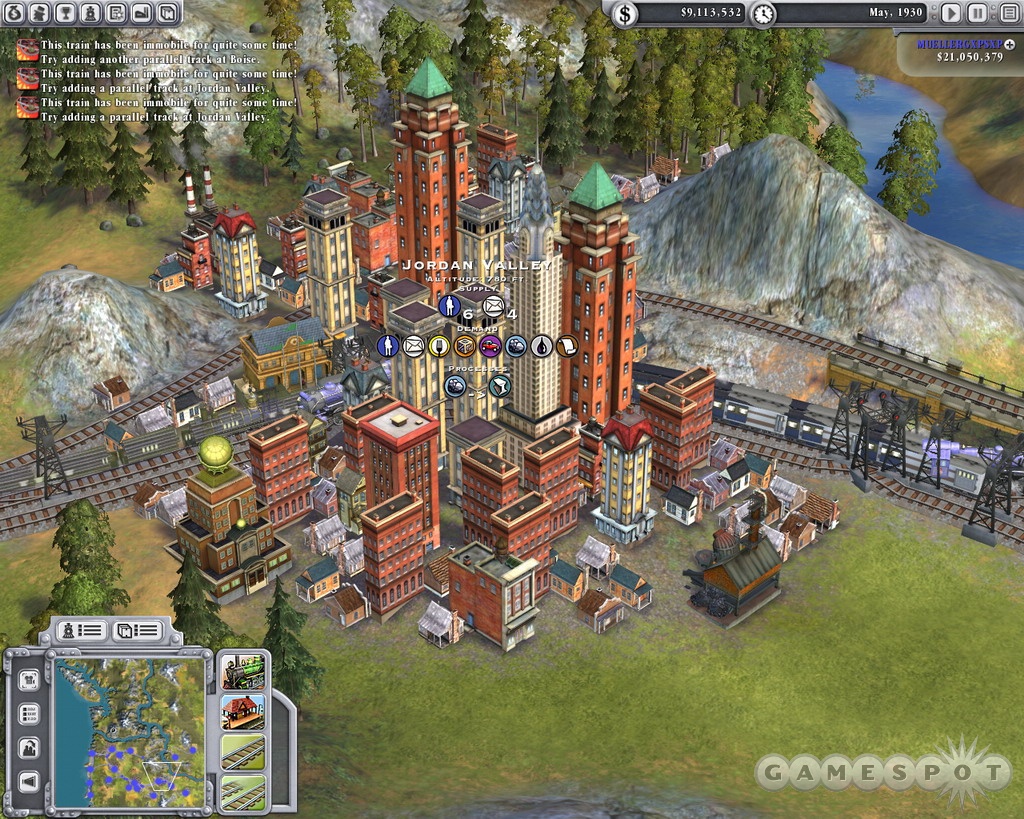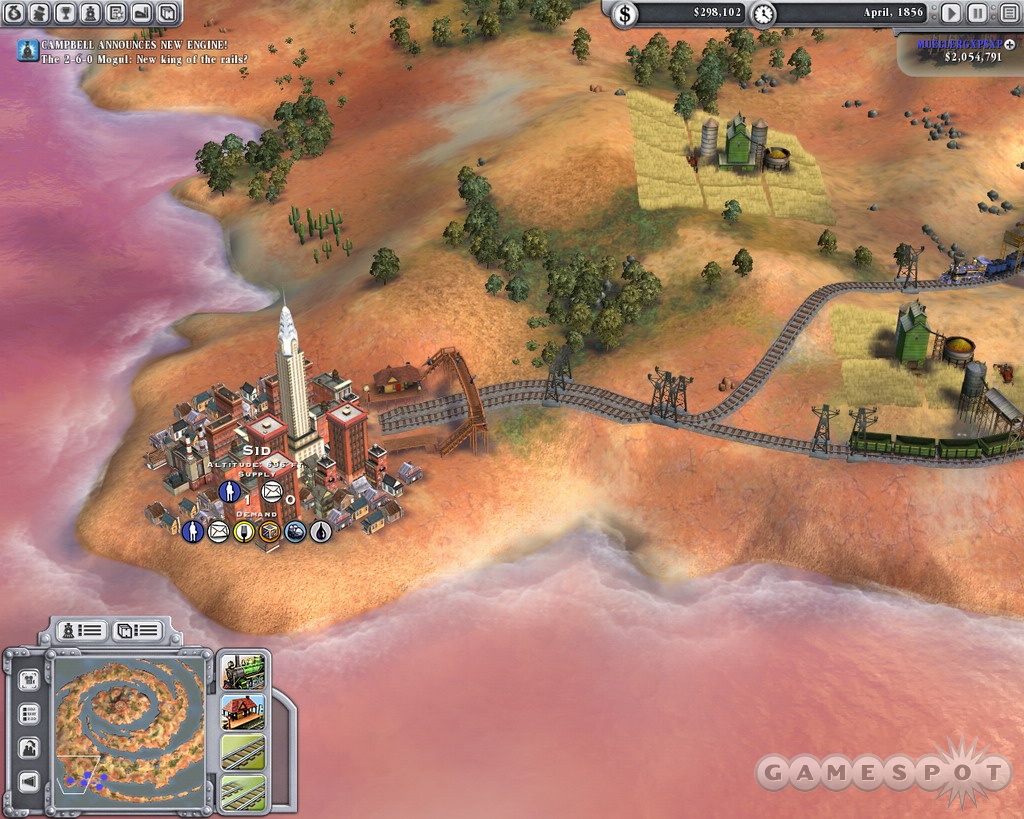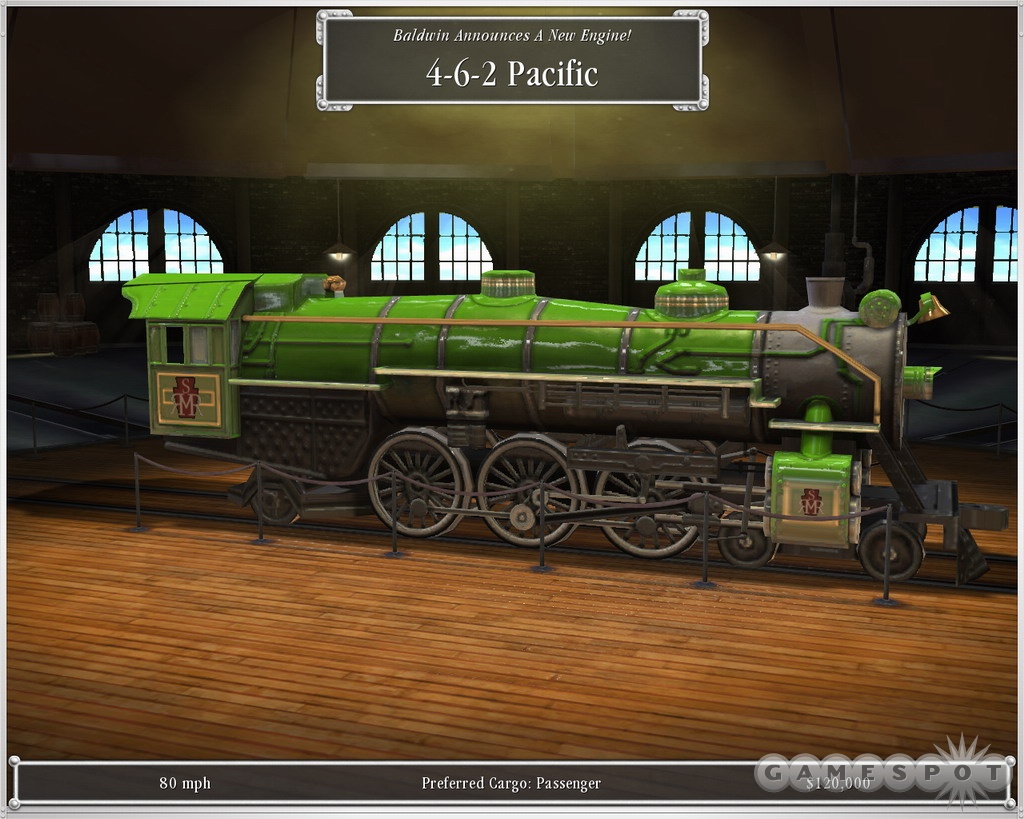Sid Meier's Railroads! might not have "tycoon" in its name, but it's still a very addictive economic strategy game that just about anyone can enjoy. Regardless of your affinity for trains, Railroads! is an engaging and surprisingly deep game that lets you do much more than lay track and watch miniature trains chug across the map. You can connect cities to trade goods and haul passengers, purchase and supply industries, play the stock market, bid on new technology, and watch cities grow as you supply them with the goods to take them from tiny backwater towns to thriving metropolises. But as complex and rewarding as building a railroad empire can be, it rarely feels daunting or tedious, which is perhaps the best thing that can be said for a game of this type.

There are 15 different fictional and historical scenarios to choose from in Railroads! The historical scenarios take place in real-world locations such as the American Southwest, the Pacific Northwest, Great Britain, France, and Germany. These scenarios cover the entire history of the railroad, from its beginnings in the mid-19th century all the way through modern day. The era affects what types of engines you can purchase, as well as the general economy. For example, if you play in any of the European countries in the first half of the 20th century, you'll want to focus on processing and shipping steel to support the war effort.
In each scenario you're usually given several goals to meet. You might have to do something as simple as connect Liverpool and Manchester, or something a bit more ambitious like earn $30 million. The goals are divided by era, so you're always working within a time frame. Depending on how many of the goals you fulfill at the end of the allotted time period, you'll be rewarded prestige points and one of several rankings ranging from Traveling Circuis Freak to President of the United States or Prime Minister.
The fictional scenarios are of course unconfined by history, so they're a bit more off-beat. There's a wide-open plains area where your routes are fast and cheap to construct; a giant lake where everything is separated by vast stretches of water, which makes it difficult to build efficiently; and a giant red cyclone-shaped continent modeled after the Firaxis company logo. As in the historical scenarios, you're given various objectives to complete within a time period and you can either fulfill those objectives or ignore them and just focus on building a massive shipping empire. Both the historical and the fictional scenarios offer a variety of challenges that make each one interesting, if not entirely unique. You can also choose to randomize the location of cities and resources to ensure that you never play the same scenario twice.
Sid Meier's Railroads! plays very much like the Railroad Tycoon games, so if you've played those you'll be right at home here. You start out with a single train depot, usually in a small town. From there it's entirely up to you how to go about building your railway. Near most towns there are several industries, such as grain farms, cattle ranches, lumber mills, coal mines, or oil wells. You can build a railroad to these industries, construct an annex to load your trains, and then purchase an engine and assign it a number of cars. You have to designate the route you want that train to take, and you can sit back and let the money roll in.
To maximize your profits, though, you'll want to take full advantage of all of your resources. To do this you'll need to purchase processing facilities in each city so that you not only get money for shipping the goods, but you also get money for processing the goods into usable materials. You can then ship those materials to other cities to make even more money. By networking cities and towns with resources you can quickly build an empire and begin making cash so fast you'll have a hard time keeping up.

But as involved and complex as the economic strategy can be, it's all very simple to approach. You'll end up constructing an entire empire of railroads and industries using only two building blocks. The only things you ever have to actually construct are tracks and train depots. Everything else is handled automatically. Towns sprout from specks on the map to massive cities full of towering skyscrapers, trains run their routes like clockwork (and conveniently never crash), and supply and demand fluctuate depending on a variety of economic forces. The only thing you have to do is click a track, move your mouse to where you want the track to end, and click the mouse button again and the track is instantly built and ready to be used. Things like bridges and tunnels are automatically constructed wherever necessary, so the only things you need to be concerned with is where you want your track to go, and what type of cargo you want to haul.
All of the other operations are handled through simple and intuitive menus. It only takes a couple clicks to purchase or sell stock, develop new processing facilities, upgrade engines and depots, and so on. There's also a bidding system in the game. If you're playing a multiplayer game and you want to buy an existing processing facility you'll have to bid for it, so you better make sure you have plenty of extra cash on hand before you initiate a purchase. Every so often a newly patented technology will come up for auction. These technologies can increase your profits, speed up your trains, and reduce maintenance costs. If you are the highest bidder at the end of a patent auction you have 10 years of exclusive access to that new technology, which gives you a significant advantage over your competitors.
Railroads! supports up to four players online or over a local network. All of the scenarios from the single-player game are available in multiplayer, along with the same objectives. You can choose to play as a real-world tycoon such as J.P. Morgan, George Hudson, and James Hill. You begin with a single depot and must build the largest empire possible and ultimately make enough money to buy out all of your competitors. The multiplayer games can get heated as players get into bidding wars over properties and patents, and race to be the first to complete each objective. It's easy to get into a game using the in-game server browser, and although we did notice some slight lag in multiplayer, it wasn't enough to significantly impact the game. If you don't have the option to play against human opponents, you can choose to play against computer-controlled tycoons. Usually the artificial intelligence is savvy enough to offer a respectable challenge without seeming cheap.
This game looks good, but you'll have to pay for all that detail in system resources. If you try running this game with the minimum system requirements you'll have to turn off all the visual effects, and even then you'll still be hit with frequent slowdown and lock-ups. There are also numerous graphical glitches, like clipping buildings, overlapping tunnels, twitching trains, and occasionally disappearing scenery. Most of these bugs are slightly annoying at worst, but they give the game a sloppy look. If you have a high-end PC you'll be able to get decent performance from this game, and when it's running smoothly and isn't too cluttered it does look good. The level of detail is impressive, and if you zoom in all the way you can see every detail of each train, building, and industry. You'll see each cow get loaded on a car, watch people mill about a train station watching the huge locomotives come in, see farmers toiling away in the fields, and so on. The visual style resembles a model train set, with detailed but not-quite-to-scale models representing trains, cities, and scenery.

The audio in Railroads! is detailed as well. You'll hear an entire array of locomotive noises, from the distinct whistles to the whoosh of the brakes as an engine pulls into a depot. If you get close to a town you'll hear some charming pastoral tunes pick up, which seem to fit the theme, but it would be nice to have some background music available beyond the towns.
Sid Meier's Railroads! strikes a comfortable balance between a deep economic simulation and an accessible, streamlined empire-building game. People looking for the same level of micromanagement of Railroad Tycoon 3 might be disappointed with just how simplified Railroads! is, but there's still plenty of depth here to make it worth a look. This is also a good game for people who are new to tycoon-style games and just want to build a virtual model railroad without worrying about the minutiae of business management. Railroads! is a game that is easy to get into, but once you're there you'll continue to find new levels of detail that will keep you playing for a long time.